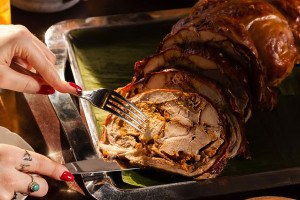Tip Log: The Legality of Auto-Gratuity
Yesterday, we discussed the slippery nature of the auto-gratuity. Today, we find out if it’s even legal!
What happens when you’ve received crappy service and an automatic gratuity is applied to your bill? Are you within your rights to refuse to pay the gratuity or to pay a lesser percent? Or are you legally bound to pony up? The answer, in all of its litigious glory, after the jump…
We turned to our favorite food-loving attorney, David “Philafoodie” Snyder (who has had his own auto gratuity issues) for the legal analysis.
The bad news: there is no definitive answer, according to the law. There are only interpretations and negotiating points. Which actually might be good news!
In short, Snyder says that a customer could negotiate his way out of an auto-grat, but a restaurant could also call the cops on the customer for violating PA’s ‘theft of services’ criminal law. Straight from the legal eagle himself:
It’s not illegal to refuse to tip your server. But if the restaurant has a policy of charging an “automatic gratuity†and you refuse to pay it, you could be in trouble.
In September 2004, Humberto A. Taveras dined at Soprano’s Italian and American Grill in Lake George, N.Y. and left only a 10% tip instead of the 18% gratuity the restaurant required for all groups of six or more. Taveras claimed he saw no notice of the policy, but the restaurant claimed it was listed on the menus. Taveras was arrested and charged with theft of services. However, the prosecutor dropped the charges based on her conclusion that all tips and gratuities are voluntary.
We were always under the impression that if a restaurant puts their auto-grat policy on their menu, it means that the customer has been given fair warning and is then legally required to pay it. But Snyder tells us that this is not codified in law. It might make it easier for the restaurant to argue its case, but it’s not actual law. We made it up!
Under the Fair Labor Standards Act… “tip†is defined as “a sum presented by a customer as a gift or gratuity in recognition of some service performed for him.†A tip is distinguished from a service charge, which the restaurant cannot use as a tip credit to offset the minimum wage. The key distinction between the two is that tips/gratuities are within the customer’s discretion, but a service charge is not.
In the Taveras case, the prosecutor decided to drop the case because the restaurant called it a “gratuity†instead of a “service charge.†However, if the restaurant had called a “service charge,†the prosecutor may have pursued the case.
Snyder doesn’t necessarily agree with this prosecutor’s conclusion. Semantics saved the day in this particular situation, but in some cases–like if you had a litigious restaurant or a prosecutor with a hair across his ass–you could be charged:
It’s true that this law was developed under the FLSA, not criminal law. However, as the Taveras case illustrates, prosecutors often look to other areas of the law for guidance. If a prosecutor believes an “automatic gratuity†is not voluntary and a restaurant complains that you failed to pay it, he or she may decide to charge you with theft of services, which is a crime under PA law. If the amount in dispute is $50 or under, it’s only a summary offense. However, if the amount in dispute is above $50, it’s a misdemeanor.
Snyder’s conclusion? “Ultimately, I’d pay the auto-grat, because I tend to be conservative when jail time is involved,” but he’d speak to a manager first and try and negotiate it out of existence. Because he’s a lawyer and he’s good at it.
We agree. It should never get to this point. If your service is that bad, complain to a manager as soon as possible. Any decent restaurant should be willing to negotiate.
Philafoodie [Official Site]


